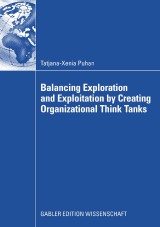Details

Balancing Exploration and Exploitation by Creating Organizational Think Tanks
|
53,49 € |
|
| Verlag: | Gabler |
| Format: | |
| Veröffentl.: | 29.08.2008 |
| ISBN/EAN: | 9783834997555 |
| Sprache: | englisch |
| Anzahl Seiten: | 141 |
Dieses eBook enthält ein Wasserzeichen.
Beschreibungen
Key for successful knowledge management is a balance between exploration and exploitation. Exploration means the generation of new knowledge in non-targeted search processes, while exploitation denotes the use of existing knowledge in targeted exploitation processes. The relationship between the two processes is one of fundamental tension; this poses a challenge to organisations which seek to make their knowledge management effective. There is a danger that exploration is neglected in favour of exploitation. This results in an organisation which lacks innovation capability. In order to prevent this, an idea has been put forward for debate in recent knowledge management research called ambidexterity, which means the simultaneous and balanced pursuing of both exploration and exploitation activities. In the following work, Tatjana-Xenia Puhan further develops this idea masterfully, by concluding that ambidexterity need not necessarily be implemented in one single organisation but can also be realised in a network of associated organisations. This approach, which she terms interorganizational ambidexterity is based on co-specialisation: one organisation is devoted solely to exploration, while associated organisations focus on their core competences in exploitation. Ms. Puhan additionally draws on the concept of the think tank. Think tanks play an increasingly important role in society: as a source of ideas, in an advisory capacity and sometimes even as devil’s advocate for the purposes of injecting new momentum to current debate in society, business and science.
Problems and concepts of R&D alignment.- Shifting think tanks from the macro-to a meso-level.- Critical issues of the organizational think tank approach.- Conclusion.
Tatjana-Xenia Puhan ist wissenschaftliche Mitarbeiterin von Prof. Dr. Markus Nöth am Lehrstuhl Bankbetriebslehre und Behavioral Finance an der Universität Hamburg.
Key for successful knowledge management is a balance between exploration and exploitation. Danger arises when exploration is neglected in favour of exploitation since that may result in an organization which lacks innovation capability. In order to prevent this, an idea has been put forward in recent knowledge management research called ambidexterity, which means the simultaneous and balanced pursuing of both exploration and exploitations activities.<br>
<br>
Tatjana-Xenia Puhan follows up on this idea by concluding that ambidexterity need not necessarily be implemented in one single organization but can also be realised in a network of associated organizations. The interorganizational ambidexterity is based on co-specialisation: one organisation is devoted solely to exploration while associated organizations focus on their competences in exploitation. Furthermore, the author develops the concept of think tanks as organizations that concentrate on radical innovations while their network associates exploit this newly generated knowledge commercially. Against the background of the hitherto largely inconclusive debate, this work is an outstanding contribution both to knowledge management research and to practical organisational structuring.<br>
<br>
Tatjana-Xenia Puhan follows up on this idea by concluding that ambidexterity need not necessarily be implemented in one single organization but can also be realised in a network of associated organizations. The interorganizational ambidexterity is based on co-specialisation: one organisation is devoted solely to exploration while associated organizations focus on their competences in exploitation. Furthermore, the author develops the concept of think tanks as organizations that concentrate on radical innovations while their network associates exploit this newly generated knowledge commercially. Against the background of the hitherto largely inconclusive debate, this work is an outstanding contribution both to knowledge management research and to practical organisational structuring.<br>
Key for successful knowledge management is a balance between exploration and exploitation. Danger arises when exploration is neglected in favour of exploitation since that may result in an organization which lacks innovation capability. In order to prevent this, an idea has been put forward in recent knowledge management research called ambidexterity, which means the simultaneous and balanced pursuing of both exploration and exploitations activities.<br>
<br>
Tatjana-Xenia Puhan follows up on this idea by concluding that ambidexterity need not necessarily be implemented in one single organization but can also be realised in a network of associated organizations. The interorganizational ambidexterity is based on co-specialisation: one organisation is devoted solely to exploration while associated organizations focus on their competences in exploitation. Furthermore, the author develops the concept of think tanks as organizations that concentrate on radical innovations while their network associates exploit this newly generated knowledge commercially. Against the background of the hitherto largely inconclusive debate, this work is an outstanding contribution both to knowledge management research and to practical organisational structuring.<br>
<br>
Tatjana-Xenia Puhan follows up on this idea by concluding that ambidexterity need not necessarily be implemented in one single organization but can also be realised in a network of associated organizations. The interorganizational ambidexterity is based on co-specialisation: one organisation is devoted solely to exploration while associated organizations focus on their competences in exploitation. Furthermore, the author develops the concept of think tanks as organizations that concentrate on radical innovations while their network associates exploit this newly generated knowledge commercially. Against the background of the hitherto largely inconclusive debate, this work is an outstanding contribution both to knowledge management research and to practical organisational structuring.<br>


















